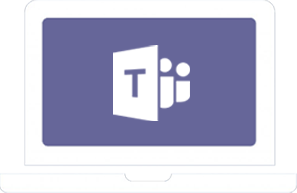RingCentral Vs Microsoft Teams
As the work-from-home initiatives for social distancing are becoming commonplace, businesses are taking great interest in business communication and collaboration tools. Microsoft Teams and RingCentral are two such powerful collaboration tools, and businesses often have a hard time selecting either of them. This article attempts to ease your decision-making by comparing them both based on their features, integrations, and adaptability.
How Does Teams Streamline Collaboration?
Microsoft Teams is a business communication solution with text messaging, voice calling, and video calling capabilities. The Microsoft Teams features give you the ability to make Voice-over-IP (VoIP) calls to other Teams Clients. With the Microsoft 365 Business Voice integration, it is also possible for Teams users to make, receive, and forward calls to and from fixed and mobile phones. This add-on enables Private Branch Exchange (PBX) capabilities required for making or joining calls from a landline or mobile phone. Teams is tightly integrated with other Microsoft Office 365 apps and provides options for connecting with third-party solutions, enabling users to seamlessly share information.
How Does RingCentral Work?
RingCentral is a Voice-over-IP tool with team collaboration features. It provides different solutions for helping businesses communicate and collaborate on various projects. The service provides features for team messaging, video meetings, VoIP calling, faxing, video conferencing, and custom application integration. RingCentral also offers you a standalone conferencing and shared meeting app called RingCentral Meetings at an additional cost. It is also necessary to do the math carefully before purchasing RingCentral products as many useful features are provided through separate add-ons to the base service.
Why Businesses Use Microsoft Teams?
RingCentral is a VoIP service with team collaboration features, whereas Microsoft Teams is a leading business communication and collaboration platform with VoIP capabilities. With Teams, it is comparatively easier to jump on a call from a text message thread. You can also share your screen and record video calls easily. Teams provides a multifaceted collaboration platform for SMBs and educational organizations. Anyone that has used Skype may find the Voice-over-IP features of Teams familiar with the added ability to quickly jump on other aspects of communication and collaboration.
Teams is tightly integrated with the Microsoft Office 365 productivity suite and comes included with Microsoft 365/Office 365 Business and Enterprise plans, which makes it highly beneficial for a Microsoft-centric environment. Teams can also provide integrations for Salesforce and many other useful business tools to allow your sales and service reps to instantly access customer records.
How to Choose Between Microsoft Teams and RingCentral?
Both Microsoft Teams and RingCentral provide a wide range of internet-based communication tools and overlap in functionality at multiple places. However, the comparison between an integrated team collaboration tool like Microsoft Teams and a VoIP solution like RingCentral may not bring a feature for a feature. Whether Teams or RingCentral will be more useful for your organization will also largely depend on your current infrastructure and business communication requirements.
Apps4Rent Provides Microsoft Solutions to Help You Enhance Team Productivity
Your choice between Microsoft Teams and RingCentral will require an in-depth study of your requirements and whether your organization relies on Microsoft productivity tools already. Strategic consulting with a Microsoft certified professional at Apps4Rent can help you gain more clarity for informed decision-making. As a Tier 1 Microsoft CSP, Apps4Rent offers its expertise in Microsoft services to help you succeed in your digital transformation initiatives. We are available 24/7 via phone, chat, and email to assist you to deploy the right Microsoft 365/Office 365 plan for Teams and other apps. Contact us today.


